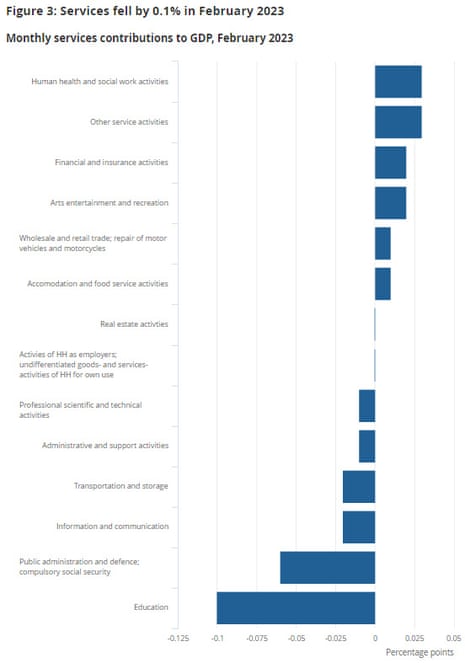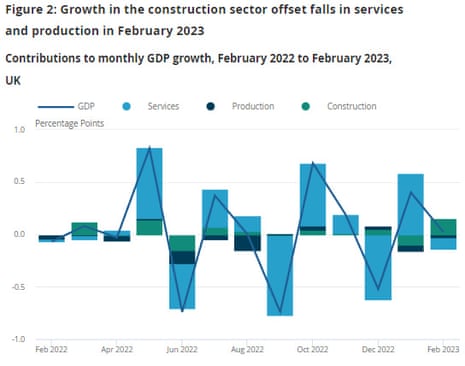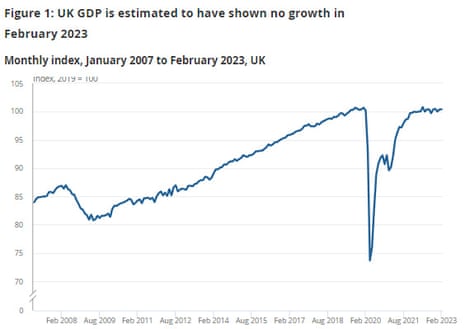ONS: Strikes held back growth
Strikes by civil servants and teachers held back growth in the economy in February, says Darren Morgan, director of economic statistics at the Office for National Statistics.
The PCS union, which represents civil servants, held the largest civil service strike for many years in February, as it stepped up a month of strikes over pay, pensions, redundancy terms and job security.
Tens of thousands of teachers in England, Scotland and Wales held strike action at the end of the month.
Morgan says this led to the flatlining in economic activity in February.
“The economy saw no growth in February overall.
“Construction grew strongly after a poor January, with increased repair work taking place.
“There was also a boost from retailing, with many shops having a buoyant month.
“These were offset by the effects of Civil Service and teachers’ strike action, which impacted the public sector, and unseasonably mild weather led to falls in the use of electricity and gas.”
The largest contributor to the negative growth in services in February 2023 was education, which fell 1.7% in the month, today’s GDP report shows.
This decline follows growth of 2.5% in January 2023. On the three months to February 2023, compared with the three months to November 2022, education fell by 1.9%.

Key events
Fidelity: UK is the weak link among developed economies
Tom Stevenson, investment director for Personal Investing at Fidelity International, also predicts the UK will suffer a year of stagnation in 2023…. before a modest rebound next year.
He fears the UK is the ‘weak link’ among developed economies (as shown by the IMF’s latest forecasts, which Jeremy Hunt has vowed to beat).
Stevenson says:
The British economy failed to grow at all in February, confirming that, while the UK may avoid recession, it is the weak link among the developed world’s economies. The UK’s growth is slower than in other rich countries and its inflation higher. We face a year of stagnation in 2023 before a modest rebound next year.
‘Although January’s growth was revised up slightly to 0.4%, February’s flat line reflects the impact of the UK’s winter of discontent. Strike action took the shine off a modest increase in retail sales, while falling production in the month offset better construction activity.
‘The latest data, and the improving trend elsewhere (such as better than forecast inflation numbers in America) confirm the International Monetary Fund’s gloomy assessment this week that put Britain at the bottom of the league table of leading economies. Only Germany is also expected by the IMF to contract this year.
The UK economy is likely to escape recession, as Jeremy Hunt predicted this morning, says Yael Selfin, Chief Economist at KPMG UK.
But rather than sparking growth, Selfin believes a period of stagnation awaits us, saying:
“A combination of upward revisions in GDP data and an improvement in global economic conditions could help the UK economy avoid a recession this year. While this will provide relief for policymakers, the outlook for growth in the medium-term remains relatively weak by historical standards.
“Economic activity will remain subdued in the near term as households continue to be squeezed by elevated prices and the cumulative impact of past interest rate increases. Although business sentiment continues to improve, bolstered in part by the fall in wholesale energy prices, we expect investment to be constrained this year amidst the tightening in credit conditions and uncertainty about future policy direction.
“UK GDP was flat in February, after growing by 0.4 per cent in January, as growth in construction was offset by falls in services and production.”
Labour: Britain is still lagging behind on the global stage
Rachel Reeves MP, Labour’s Shadow Chancellor of the Exchequer, says:
“Despite our enormous promise and potential as a country, Britain is still lagging behind on the global stage with growth on the floor.
“The reality of growth inching along is families worse off, high streets in decline and a weaker economy that leaves us vulnerable to shocks.
“These results are exactly why Labour’s mission to secure the highest sustained growth in the G7 is so important - it’s that level of ambition that we need to strengthen our economy, get our high streets thriving again and make families across every part of Britain better off.”

Yesterday, Labour launched its five-point plan to support UK high streets, which included cutting business rates and energy bills, stamping out late payments, and vouchers for energy efficiency measures including “double glazing at a local cinema, a new heat pump in a cafe or an electric vehicle for a takeaway”.
Hunt: economic outlook is looking brighter than expected
Jeremy Hunt has taken a glass-half-full approach to the news that the UK economy flatlined in February – pointing out that it did grow (by just 0.1%) in the last quarter.
The chancellor says that the UK is now going to avoid recession:
“The economic outlook is looking brighter than expected - GDP grew in the three months to February and we are set to avoid recession thanks to the steps we have taken through a massive package of cost-of-living support for families and radical reforms to boost the jobs market and business investment.”
ONS: Strikes held back growth
Strikes by civil servants and teachers held back growth in the economy in February, says Darren Morgan, director of economic statistics at the Office for National Statistics.
The PCS union, which represents civil servants, held the largest civil service strike for many years in February, as it stepped up a month of strikes over pay, pensions, redundancy terms and job security.
Tens of thousands of teachers in England, Scotland and Wales held strike action at the end of the month.
Morgan says this led to the flatlining in economic activity in February.
“The economy saw no growth in February overall.
“Construction grew strongly after a poor January, with increased repair work taking place.
“There was also a boost from retailing, with many shops having a buoyant month.
“These were offset by the effects of Civil Service and teachers’ strike action, which impacted the public sector, and unseasonably mild weather led to falls in the use of electricity and gas.”
The largest contributor to the negative growth in services in February 2023 was education, which fell 1.7% in the month, today’s GDP report shows.
This decline follows growth of 2.5% in January 2023. On the three months to February 2023, compared with the three months to November 2022, education fell by 1.9%.

On a monthly basis, the UK economy is now estimated to be 0.3% above its pre-Covid-19 levels in February 2020.

UK economy stagnated in February
Newsflash: UK economy growth has flatlined.
UK GDP was unchanged in February, new data from the Office for National Statistics shows, weaker than the forecast for 0.1% growth.
The ONS reports that the services sector output fell by 0.1%, while production fell 0.2% and construction grew 2.4%.
This follows growth of 0.4% in January, which has been revised up from growth of 0.3% in the previous publication.
And the broader picture is that GDP grew by 0.1% in the three months to February 2023.
The ONS says:
The services sector fell by 0.1% in February 2023, after growing by 0.7% in January 2023, revised up from 0.5% in the previous publication.
The largest contributions to the fall in services output in February 2023 came from education and public administration and defence; compulsory social security, industrial action took place in both of these industries in February 2023.
Output in consumer-facing services grew by 0.4% in February 2023, this follows growth of 0.3% in January 2023 (unrevised from our previous publication); the largest contributor to this growth came from retail trade, except for motor vehicles and motorcycles.
Production output fell by 0.2% in February 2023, following a fall of 0.5% in January 2023, revised from a fall of 0.3% in the previous publication.
The construction sector grew by 2.4% in February 2023, after falling by 1.7% in January 2023 (unrevised from the previous publication).
UK will beat IMF’s dismal growth forecasts, chancellor Hunt Say
UK chancellor Jeremy Hunt has insisted that the International Monetary Fund is wrong about Britain’s economic prospects.
Hunt has pledged that the UK economy will do “significantly better” than the International Monetary Fund’s bleak outlook over the coming 24 months.
He pushed back against the IMF’s forecast for the UK will shrink 0.3% this year and expand just 1% in 2024.
Speaking to Bloomberg News on the sidelines of the IMF’s spring meeting in Washington, Mr Hunt said:
“We will do better than that. Our forecasts are significantly better.”
Sanjay Raja, chief UK economist at Deutsche Bank, predicts the UK economy will stagnate this year.
Raja told clients this week that Deutsche expects UK GDP growth to have slowed down in Februaryto +0.1%, after January GDP came in slightly stronger at 0.3% month-on-month.
He explained:
We expect broad-based growth in February, driven by services activity (0.1% m-o-m), industrial production (0.2% m-o-m), and construction output (0.7% m-o-m).
Where does this leave us? We still expect Q1-23 GDP to flatline, and Q2-23 GDP to contract (albeit marginally at -0.2% q-o-q). Risks to our H1-23 forecasts are tilted marginally to the upside, however. Big picture, as we recently noted, we no longer see a technical recession on the horizon. Instead, we see the UK in stagnation this year, before expanding in 2024.
Introduction: UK February GDP report coming up
Good morning, and welcome to our rolling coverage of business, the financial markets and the world economy.
Although a recession has been avoided, for now at least, the UK economy remains in a troubling state. The International Monetary Fund predicts it will shrink this year, the worst performance among the G20 nations.
High interest rates, energy costs, and the ongoing cost of living crisis are all hitting growth.
And today, we’ll learn how the economy fared in February when the Office for National Statistics releases its first estimate of GDP that month, at 7am.
Economists predict that growth slowed in February, to around 0.1%, after a 0.3% rise in GDP in January. Any growth would be welcome, and help avoid the economy shrinking in the first quarter of this year.
Having seen the UK economy revised up to 0.1% GDP growth in Q4, thus avoiding the ignominy of a technical recession, the economic data since the end of last year has shown much greater resilience than many had feared at the end of last year.
So says Michael Hewson of CMC Markets, who explains:
This has been particularly notable in the services sector, which after a weak Q4 has seen recent monthly PMI numbers recover strongly in February and March. Consumer spending has also picked up sharply with a lot of the recent retail updates showing that while consumers do have money to spend, they are spending it more judiciously. In January the UK economy grew by 0.3%, despite sky-high inflation, as consumer spending rebounded with retail sales gaining 0.9%.
This was followed by a 1.2% gain in February, although sales volumes have lagged due to higher prices. Against such a backdrop, another positive GDP number for February could well go some way to increasing the odds of a positive Q1 GDP print for 2023, with expectations of a 0.1% gain, although index of services could act as a drag after a strong January of 0.5%.
Construction output is also expected to rebound by 1% in February after a sharp -1.7% decline in January.
Minutes from the US central bank’s last monetary policy meeting showed that its policymakers fear that the fallout from the US banking crisis is likely to tilt America’s economy into recession later this year.
Also coming up today
Supermarket giant Tesco will report its preliminary results for 2022/23 at 7am.
The IMF and World Bank’s Spring Meeting continues in Washington, as top policymakers discuss the state of the world economy.
The latest US PPI data will show how fast US goods and services producers lifted their prices last month. In January this key inflation measure fell dramatically.
We’ll also hear from the Bank of England’s chief economist, Huw Pill, on the state of the UK economy this afternoon.
Yesterday the governor of the Bank of England, Andrew Bailey, played down the risks of a system-wide banking crisis, paving the way for further interest rate increases to combat the UK’s high inflation levels.
The agenda
7am BST: UK GDP report for February
7am BST: UK goods trade balance for February
10am BST: Eurozone industrial production report for February
1.30pm BST: US PPI index of producer price inflation for March
1.30pm BST: US initial jobless claims
2pm BST: Bank of England chief economist Huw Pill speaks on “Developments in the UK Economy and Monetary Policy”

 1 year ago
144
1 year ago
144










 English (US)
English (US)